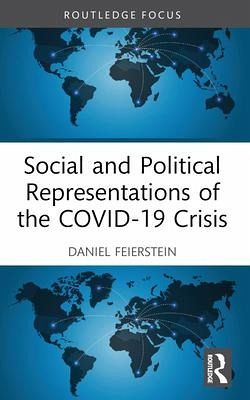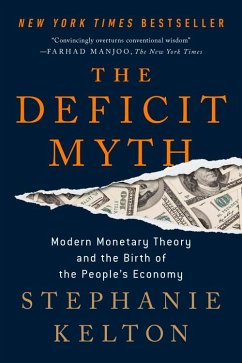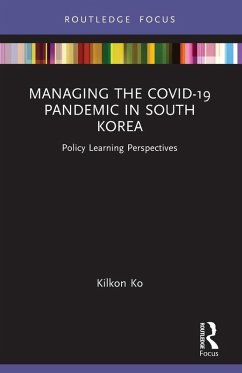Daniel Feierstein
Broschiertes Buch
Social and Political Representations of the COVID-19 Crisis
Versandkostenfrei!
Versandfertig in 1-2 Wochen
Weitere Ausgaben:

PAYBACK Punkte
15 °P sammeln!





Weaving together political, sociological, psychological and epidemiological analyses, Social and Political Representations of the COVID-19 Crisis provides revealing insights into the transformations wrought by the pandemic and the social divisions it has exposed.
Daniel Feierstein is Director of the Centre of Genocide Studies at the National University of Tres de Febrero, Argentina, and Director of the Observatory of State Crimes at the University of Buenos Aires, Argentina. He is also Senior Researcher at the National Research Council of Argentina (CONICET). His work primarily focuses on genocidal social practices and has been crucial in the increased recognition of the Argentine military junta's crimes as genocide. He is a previous president of the International Association of Genocide Scholars and has acted as a judge on the Permanent People's Tribunal in Sri Lanka, Mexico, Myanmar, and Colombia. He is the author of several books, including Genocide as a Social Practice: Reorganizing Society under the Nazis and Argentina's Military Juntas (Rutgers University Press, 2014) and Memorias y Representaciones: Sobre la elaboracion del genocidio I (FCE, 2012). During the COVID- 19 pandemic, Feierstein participated in numerous national and provincial advisory councils in Argentina assessing the social aspects of the crisis.
Produktdetails
- Verlag: Routledge
- Seitenzahl: 124
- Erscheinungstermin: 29. Januar 2024
- Englisch
- Abmessung: 216mm x 140mm x 7mm
- Gewicht: 167g
- ISBN-13: 9781032212791
- ISBN-10: 1032212799
- Artikelnr.: 69924738
Herstellerkennzeichnung
Libri GmbH
Europaallee 1
36244 Bad Hersfeld
gpsr@libri.de
"Daniel Feierstein's basic contention is controversial but convincing: despite its biological origin, the COVID-19 pandemic was primarily a social phenom- enon. Politicians of all stripes failed to fully grasp that fact. Understanding state policies, civil responses, outcomes, and long-term consequences requires socio- logical and political analysis. COVID-19 has involved a continuous struggle, sometimes disguised, other times overt, between the economy and the health needs of ordinary citizens. Feierstein's sophisticated analysis works at three levels: epistemological, emotional, and ethical-moral. His analysis comes alive in terms of his insights into the failed policies of Argentina - a society with a deep commitment to individualism and
Mehr anzeigen
an historical distrust of state power. At the psycho-analytical dimension, Feierstein uncovers the many responses we make towards catastrophe: denial, projection, and scapegoating. The result is a volume rich in insights into the psychological, social, and political dimensions of the catastrophe that engulfs us."
Bryan S. Turner, Professor of Sociology and Director of the Institute for Religion, Politics and Society at the Australian Catholic University, Australia, Honorary Professor and Director of the Centre for Citizenship, Social Pluralism and Religious Diversity at Potsdam University, Germany, and Emeritus Professor at the Graduate Center at the City University of New York City (CUNY), USA
"In this ambitious study, Daniel Feierstein shows how despite its biological ori- gins the COVID-19 pandemic has been an eminently social phenomenon. The book provides original insights into the collective psychology of catastrophes, focusing on the defense mechanisms of denial and projection as prerequisites for citizen responsibility; emotions largely absent in neoliberal consumerist societies promoting selfish individualism and egocentrism. While Feierstein is careful to avoid post-pandemic futurology, his analysis provides valuable insights into the trajectory of the pandemic to date, as well as offering a critique of the social and political limits of responses nested within an individualistic consumer culture."
Greg Martin, Associate Professor of Criminology, Law and Society, University of Sydney, Australia
"In Social and Political Representations of the COVID-19 Crisis, Dr. Feierstein does a masterful job of examining state responses to the challenges posed by COVID-19 pandemic and the effects these state actions have on various popula- tions in society. Feierstein connects these broad social responses to COVID-19 with individual psychological defense mechanisms people use to cope with a new reality in light of the pandemic. Finally, Dr. Feierstein illustrates how the pandemic can be an opportunity for social change, either positive or negative. This thought-provoking book is a must-read for public health policy-makers and health care professionals."
Dinur Blum, Lecturer in Sociology, California State University, Los Angeles, USA
Bryan S. Turner, Professor of Sociology and Director of the Institute for Religion, Politics and Society at the Australian Catholic University, Australia, Honorary Professor and Director of the Centre for Citizenship, Social Pluralism and Religious Diversity at Potsdam University, Germany, and Emeritus Professor at the Graduate Center at the City University of New York City (CUNY), USA
"In this ambitious study, Daniel Feierstein shows how despite its biological ori- gins the COVID-19 pandemic has been an eminently social phenomenon. The book provides original insights into the collective psychology of catastrophes, focusing on the defense mechanisms of denial and projection as prerequisites for citizen responsibility; emotions largely absent in neoliberal consumerist societies promoting selfish individualism and egocentrism. While Feierstein is careful to avoid post-pandemic futurology, his analysis provides valuable insights into the trajectory of the pandemic to date, as well as offering a critique of the social and political limits of responses nested within an individualistic consumer culture."
Greg Martin, Associate Professor of Criminology, Law and Society, University of Sydney, Australia
"In Social and Political Representations of the COVID-19 Crisis, Dr. Feierstein does a masterful job of examining state responses to the challenges posed by COVID-19 pandemic and the effects these state actions have on various popula- tions in society. Feierstein connects these broad social responses to COVID-19 with individual psychological defense mechanisms people use to cope with a new reality in light of the pandemic. Finally, Dr. Feierstein illustrates how the pandemic can be an opportunity for social change, either positive or negative. This thought-provoking book is a must-read for public health policy-makers and health care professionals."
Dinur Blum, Lecturer in Sociology, California State University, Los Angeles, USA
Schließen
Für dieses Produkt wurde noch keine Bewertung abgegeben. Wir würden uns sehr freuen, wenn du die erste Bewertung schreibst!
Eine Bewertung schreiben
Eine Bewertung schreiben
Andere Kunden interessierten sich für














